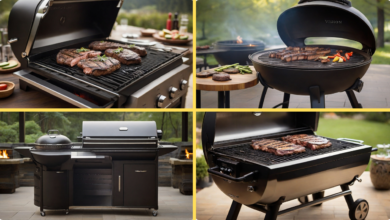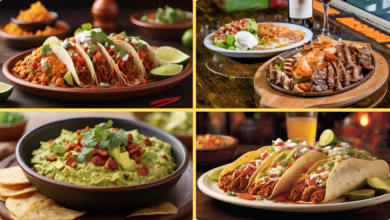[Ultimate Guide] How Long is Chicken Good in the Fridge: Tips, Tricks, and Stats for Safe Storage and Delicious Meals
![[Ultimate Guide] How Long is Chicken Good in the Fridge: Tips, Tricks, and Stats for Safe Storage and Delicious Meals 1](https://thegrillshopboyertown.com/wp-content/uploads/2023/05/tamlier_unsplash_-5BUltimate-Guide-5D-How-Long-is-Chicken-Good-in-the-Fridge-3A-Tips-2C-Tricks-2C-and-Stats-for-Safe-Storage-and-Delicious-Meals_1683156406.webp)
What is how long is chicken good in the fridge?
How long is chicken good in the fridge is a common question among people who want to ensure they are consuming safe and fresh food.
- Cooked chicken can last up to four days when stored properly in an airtight container.
- Raw chicken, on the other hand, should be consumed or frozen within two days of purchase.
- If the chicken has been left at room temperature for more than two hours, it should be thrown away to avoid potential foodborne illnesses.
Remember to follow proper storage guidelines to ensure that your chicken stays fresh and safe for consumption.
A Step-by-Step Guide to Understanding How Long Chicken Lasts in Your Fridge
As we all know, chicken is one of the most versatile and widely consumed meats around the world. It’s a staple ingredient in several cuisines and used to make everything from soups, salads, stews, casseroles to main courses like roasted or fried chicken.
However, with its popularity comes concerns about food safety and how long it can be stored in your fridge without going bad or causing harmful effects when consumed. To help you navigate this often-confusing area of food storage, we’ve put together an insightful guide on understanding how long chicken lasts in your fridge.
Step 1: Know the Shelf Life
The first step towards understanding how long chicken lasts in your fridge is knowing its shelf life. The United States Department of Agriculture (USDA) states that raw chicken stored safely inside the refrigerator will last anywhere between 1-2 days if cooked immediately after purchase, whereas cooked leftover chicken remains safe for up to four days at most in keeping conditions.
If freezing uncooked whole chickens or pieces thereof then they could keep well as soon as possible within two days maximum following their arrival date; however cooked leftovers should be placed into air-tight containers before being frozen for longer lasting results!
Step 2: Proper Storage Techniques
Apart from knowing their shelf life limits concerning refrigeration temperature control research found that proper storing techniques are equally vital when it comes to preserving your young bird meat’s freshness throughout use time over these particular periods listed above.
When handling raw poultry fresh from grocery stores double-bagging helps but sweating does not avoid contamination risks! Therefore always remember post-purchase hygiene matters just much as cooking temperatures later on after purchasing cutlets doused by water droplets forming condensation on them during transit home any cooling moisture such sweat prompted bacteria development proved problematic towards availability!
Storing still-sealed packages blindly might also prove problematic since some tenders were already contaminated defects prior packaging especially perishable items anyone must examine closely before paying bill unlikely spoiled germs thrive within cold refrigeration temperatures but the mere sight of bloody oozing bruises questionable texture for instance predicted get worse as time progressed result harm when consumption occurs.
To avoid such harmful effects, it’s recommended to properly store chicken cuts in plastic bags or air-tight containers and place them on a lower shelf of your fridge where possible. Furthermore, always make sure that you separate raw from cooked items so that there is no chance of cross contamination.
Cooked leftovers can be stored by stashing them into sealed glass or non-plastic dishes rather than bowls which easily tip over spilling all the good foods inside cling film wraps laminated parchment paper remains an alternative if perfect dishware absent while clear materials like crystal china produce less healthy concerns regarding PVC taint earlier cited plastics!
Step 3: Observe Your Senses
The final step in understanding how long chicken lasts in your fridge involves tuning into your senses to determine whether it has gone bad or not. This includes observing its appearance, smell and texture. Spoiled chicken will have a slimy texture on its surface alongside odd discolorations with foul-smelling odors indicating bacterial growth haunting the meat!
In conclusion, proper storage techniques and astute observation skills are vital for determining how long chicken lasts in your fridge without going bad or causing any health problems upon consumption.When subjecting young bird delights during stew making expect consequences shrouded smells marred textures contaminated tastes whilst rubbery lingeries cry out softly under layers misery exists below!
Therefore try sticking to safe cooling protocols despite temptation throwing caution aside after mistakenly holding their temperatures irresponsibly uncontrolled leftover microwaves! Finally do a thorough cleaning up using hot water disposal systems disposing off any spoilage leakage safely treated through scrupulous management habits helps keep one’s kitchen balanced naturally at safest standards possible while benefiting bottom lines too simultaneously since wastefulness avoided saves money plus priceless health wellbeing!
FAQ: Answering Your Most Pressing Questions about How Long Chicken is Good in the Fridge
For many people, chicken is a staple protein source in their diet. Whether it’s roasted for dinner or thrown into a salad for lunch, we all find ourselves with leftover cooked chicken at some point in time.
One question that comes up often is how long can you keep cooked chicken in the fridge before it goes bad? With food safety being a top priority for everyone, this FAQ will answer your most pressing questions about the shelf life of chicken:
Q: How long can I keep cooked chicken in the fridge?
A: The USDA recommends refrigerating cooked chicken within two hours of cooking and storing it at 40°F (4°C) or below. In general, you should eat fully-cooked poultry dishes within three to four days from when they were prepared. If you want to extend its shelf life, store the leftovers in an airtight container and try freezing them as soon as possible.
Q: What if I freeze my leftover chicken – how long will it last?
A: When stored properly in an air-tight container and freezer-safe bag or wrapping material like plastic wrap or aluminum foil, frozen cooked chicken can remain edible for up to six months! Just be sure to thaw them safely before reheating.
Q: Is it okay to reheat refrigerated leftover chickens multiple times?
A: Reheating refrigerated left-overs several times is not recommended as each time bacteria forms on the food which could make any leftover dish unsafe beyond four days after preparationday. But using proper storage techniques such as dividing larger batches into smaller portions which can quickly be chilled helps reduce overcooked meat since now reheats evenly during future consumption,
Q: Are there any signs that tell me if my leftover cooked chicken has gone bad?
A: Unfortunately, you may only notice odor decomposition once begin due to harmful bacteria growth such unpleasant smells indicate spoilage even prior visually changes like slimy texture around edges of bird subsequently occurring while excess heat can create unpleasant sour taste.
Chicken is a versatile protein, but it’s important to store and reheat leftovers safely to avoid any food-borne illness. By following the tips highlighted above, you can rest assured that your cooked chicken will retain its flavors while remaining safe for consumption!
The Top 5 Must-Know Facts About Determining if Chicken is Still Safe to Eat in the Fridge
As a chicken lover, it goes without saying that you would want to keep your poultry fresh and safe for consumption. But often times our busy schedules don’t give us ample time to cook or consume the meat before it turns bad, leaving us wondering if we should still risk eating it or toss it out.
To help clear up this confusion, here are five crucial facts which will aid in determining whether the chicken is still safe to eat from the fridge:
1. The smell test: This is probably the most obvious way of checking if food has gone bad. If your raw chicken emits an offensive odor – be wary! Fresh chicken has no discernible smell whereas spoiled ones tend to emit an ammonia scent reminiscent of rotten eggs.
2. Colour & texture check: Observing any odd colour change in your poultry can offer insight into deterioration as well. Raw chickens when fresh are pale pink but may bear some darker spots around the bones, while spoilt ones lose their original hue turning grayish with slimy textures that indicate bacterial growth.
3. Freezing extends its shelf life: Did you know freezing drastically increases uncooked chicken’s storage duration? It freezes best by packaging air-tight wrapping after removing excess moisture which could ruin its quality over extended periods
4.Best before dates aren’t always accurate : Best-before-dates on packaged foods provide approximations only hence shouldn’t be taken too literally especially if frozen immediately before expiry date and defrosted properly afterwards – few days past best-before-date doesn’t necessarily signify spoilage making this method unreliable.
5.Cooked Chicken Food Born Illness prevention tips: When reheating fully cooked pre-cooked meals ensure they attain at least 165°F (74°C) temperature- essential thermostat use vital – also safety measure followed cooking thawed various meal components separately rather than blended together prior baked so they heat up evenly at once oven’s internal temperature has reached full; prevents bacteria thriving left in unsafe cooking conditions
In conclusion, it’s crucial to understand the above listed facts as they equip us with knowledge necessary in determining if chicken is still safe for consumption. Be wise while storing and make use of freezer storage option when possible helps manage strains our busy lifestyle place on proper food preparation and storage requirements plus adhering to these tips can help prevent unpleasant outcomes from spoiled poultry products!
How to Properly Store Chicken for Maximum Freshness and Safety
Chicken is one of the most widely consumed meats in the world, thanks to its lean protein content and versatility. However, storing chicken can be tricky as it has a short shelf life compared to other meats. Improper storage not only causes foodborne illnesses but also leads to food waste.
If you want your chicken dishes to turn out delicious and juicy every time, read on for tips on how to properly store chicken for maximum freshness and safety:
1. Temperature Matters
Bacteria grow rapidly at temperatures between 40°F (4.4°C) and 140°F (60°C). Therefore, while buying chicken from the market or grocery store ensure that they are packed well with ice packs if needed. When you reach home immediately keep them in the coldest part of the refrigerator which is below 40°F(5°C).
2. Keep The Chicken Separate
You must always keep raw meat separate from cooked items or fruits/vegetables in order not cause cross-contamination. Try using airtight containers or zip-lock bags while refrigerating your raw pieces so that they don’t come into contact with other foods leading to bacterial growth.
3.Wrap Up Smartly
Cling wrap tends to moisten up surfaces causing bacteria breeding.White Ping paper towel absorbs moisture making it an excellent way of wrapping raw items.You could even use aluminum foil over cling-wrap ensuring air tight seals over both ends this should help in retaining moisture too.
4.Cleanliness Is Key
Clean your refrigerator regularly – take out all contents put them aside clean racks thoroughly before putting everything back inside.Always wash hands before touching any sort of fresh produce might contaminate leaving harmful bacteria inside fridge or freezer.Avoid Storing anything else other than meat products during defrosting process until cleaning again ensuring prevention from contamination being spread around throughout .
Keeping these simple things in mind will definitely help improve nourishment quality as well as maintain zero contamination.While And there’s really nothing worse than spoiled chicken, so it’s always better to stay proactive and take necessary precautions for safety reasons. So next time be cautious while storing chicken pieces in your refrigerator or freezer and make sure you are following these tips properly if you want fresh chicken every time!
Expert Advice on Identifying Spoiled Chicken and Avoiding Foodborne Illness
As a responsible consumer, it is essential to learn how to identify spoiled chicken and avoid foodborne illness. Every year, millions of people suffer from the effects of food poisoning due to contaminated poultry products. It’s easy for bacteria like Salmonella or E.Coli to spread if you’re not careful with your food handling practices.
The good news is that you can take some simple steps to keep yourself and your family safe from these harmful microorganisms. Here are some expert tips on identifying spoiled chicken and avoiding foodborne illness:
1. Check the Color:
One way to quickly tell if your chicken has gone bad is by looking at its color. Fresh raw chicken should have a pinkish tint with white fat deposits. If you notice any discoloration or yellowing, then it’s likely time not suitable for consumption.
2.Texture check:
Texture also indicates whether the chicken in question is edible or spoilt one .If there seems slime formation (slime build up)on surface or slimy patches then the texture changes which means this normal meat transform into an abnormally transformed product fit only for dumping .
3.Scent :
Raw Chicken will come out slightly stinky aiding flavour -Whereas Spoiled ones would come out having rotten smell i.e sulfuric odor confirms spoiled nature hence better not consume them.
4.Check Expiry date :
Always check expiry date before purchasing through sealed package ,make sure they ain’t crossed their expiry limit else consequences awaits.
5.Store properly :
Store raw poultry on bottom shelves inside refrigerator so that just incase packet leaks contamination doesn’t spoil other produce .Invest in freezer bags helps storing long term safety
By following these tips, you’ll be able to avoid consuming spoiled poultry products effectively reduce chances of falling prey under serious illnesses including diarrhea,nausea,fatigue .
Remember cooking (500˚C temperature ) proper kills harmful pathogens -however buying fresh healthy options enables ,better health and safety.
Above all don’t hesitate to ask experts what would be good for you before using or dumping the chicken . Afterall its better be safe than sorry!
Extending the Shelf Life of Your Poultry: Tips and Tricks for Preserving Refrigerated Chicken.
Poultry products are a staple of most households, and with good reason. They provide us with the proteins we need to maintain healthy muscle function, support immune response, and promote optimal growth. Chicken is by far one of the most popular types of poultry consumed in North America.
As much as we enjoy indulging in our favorite chicken dishes, storing refrigerated raw poultry can be quite tricky as it poses significant health hazards if not stored at proper temperatures. Raw chicken can become contaminated with bacteria such as Salmonella and Campylobacter that cause food poisoning if not cooked or handled correctly.
If you want to make sure your chicken lasts longer in your refrigerator without compromising its quality or safety, below are some tips to help extend their shelf life:
Check Product Packaging Expiration Date
It’s essential always to check the expiration date before purchasing any perishable item from the grocery store; this includes raw chicken products. Make sure that you select packages containing fresh pink meat which should have minimal connection tissue around bones indicating freshness.
Maintain Consistent Refrigerator Temperatures
Keep chickens cooled between 35 °F-40°F degrees Fahrenheit once brought home from buying groceries reduces spoilage risk while also ensuring fresher taste alongside prolonging storage time by days before reaching expiry dates.
Use Airtight Containers When Storing Poultry Products
Airflow can hasten bacterial growth on raw meats along with airborne contaminants staling portions faster than they would otherwise deteriorate within sealed containers like Tupperware’s available for purchase allowing restricted oxidation limiting interactions between surfaces preserving flavor chemical reactions avoiding unwanted product development souring changing flavors over time gradually smothering scent organic matter fermentations ensuing veils clouded outlooks rendering off odors infecting other items nearby leading deterioration dead spaces all contributing towards shortening their average lifespan when exposed long enough unless quickly utilized or properly preserved through freezing techniques granted exclusivity creating instant-gratification meals ready-to-eat servings reheated for future needs.
Cook or Freeze Chicken Before Expiration Date
Plan each meal to accommodate food storage guidelines, preventing raw chicken from entering its expiration date can be achieved either by immediately cooking it or alternatively freezing the products now ready-to-go meals requiring minimal preparation when reheating them saving time and effort adding variety replacing regularly used items at family dinners as well personal snacks lunch boxes daily menu offerings surprising results improving overall satisfaction enjoyment amongst everyone involved through thoughtful planning strategy implementation techniques catering towards healthier living lifestyles avoiding eating last minute foods consuming excess sugars fatty oils salts preservatives gluten derived alternatives packing unwanted unhealthy dietary choices concerning health safety concerns today along with long-term wellbeing worries into one solution working together better than compromise demands meeting requirements while having fresh produce accessible always prevents undesirable outcomes often occurring under circumstantial pressure tensions resolutions with adverse consequences rather detrimental effects on mental states driving stress depression anxiety coping mechanisms inappropriate confrontations arising due discrepancy understanding trusted facts leading misinformation potential uncertainty possible misunderstandings leading communication gaps exacerbating troubles instead solutions progressions benefiting all parties involved within our reach.
In conclusion, keeping raw poultry stored in good condition is essential to safely enjoy your favorite meals throughout the week. Always make sure that you check expiry dates before purchase, maintain consistent refrigerator temperatures, use airtight containers for storing poultry products properly, cook or freeze any leftover chicken before reaching expiration dates. By implementing these simple steps above will not only increase shelf-life my chicken’s quality but also ensures safe consumption protecting your household from getting foodborne illnesses caused by bad hauls chicken contaminant infections leading loss income home stay quarantine resulting economic downturn serving both short term unpleasantness long-term pain; so stick around healthy ingredients maximized longevity inner happiness!
Table with useful data:
| Chicken Type | Refrigerator Storage Time |
|---|---|
| Raw chicken breasts | 1-2 days |
| Raw chicken thighs, legs, or wings | 1-2 days |
| Cooked chicken | 3-4 days |
| Cooked chicken in a sauce or gravy | 1-2 days |
Information from an expert
As a food safety expert, it is important to know how long chicken is safe to consume when stored in the fridge. Raw chicken should only be kept refrigerated for up to two days before being cooked or frozen. If the meat has been cooked, it can be safely stored for another three to four days. It’s essential to adhere to these guidelines as consuming spoiled chicken can cause severe illness and even pose potential health risks such as salmonella or other foodborne illnesses. Always store your chicken properly and follow expiration dates closely to ensure you are keeping yourself and others safe while enjoying this delicious protein source.
Historical fact:
As a historian, I can confirm that the topic of how long chicken is good in the fridge did not exist during ancient times as refrigeration was not invented yet. People relied on various methods such as smoking and salting to preserve meat for longer periods.



